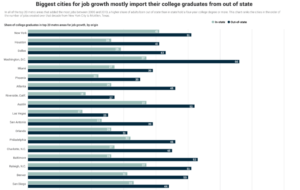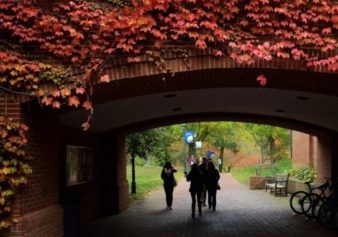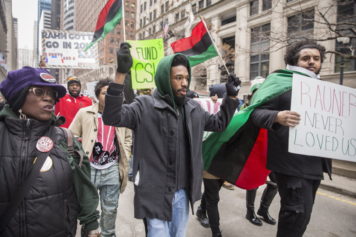
Cities like Washington, D.C., Atlanta and San Francisco boast tons of opportunity for their vast populations of Black residents who hold a bachelor’s degree, but numbers alone don’t provide a full representation of what’s really going on within these cities and others all across the globe.
Even when statistics suggest that one city’s Black population is flourishing, it may turn out that the struggles of the local Black community is merely being hidden in the shadows of successes of professional transplants.
Atlanta serves as a prime example.
For years, the city has been growing at an exponential rate and has even been deemed Hollywood’s new rival.
The technology sector is growing just as quickly as the city’s entertainment industry while also serving as a popular education and government hub that welcomes startups and young entrepreneurs with open arms.
It sounds like the perfect landscape for the city’s local community, but all that opportunity and national attention also attracts a plethora of out-of-state graduates who go on to fill coveted jobs when local students fail to keep up.
According to the National Journal, while Atlanta has an impressive rate of Black high school graduates, a vast majority of their professionals are college graduates from out of state.
The report revealed that while 26 percent of Atlanta’s college graduate population was in-state students, 46 percent came from out of state.
The same trend remained true for each of the top-ranked cities for Black achievement in bachelor’s degrees.
Washington, D.C., has a percentage of Black residents with a bachelor’s degree that pushes beyond the 30 percent mark, but 66 percent of the state’s college graduate population comes from out of state.
More than 25 percent of the Black population in Raleigh, North Carolina, has a bachelor’s degree, but 51 percent of the state’s graduate population comes from out of state.
The same pattern remains true for Nashville, Houston, New York City and Seattle. While there is nothing wrong with attracting successful candidates from other states, it is dire that local Black students are given the same opportunities as their counterparts from districts that left them better prepared for college life and, ultimately, the professional world.
Not to mention the reality that local economies won’t be able to flourish off transplants forever.
“We’re now at a point in Georgia where you can’t sustain those high attainment rates just by importing more people,” Kent McGuire, president of the Southern Education Foundation and former assistant secretary of the Department of Education during the Clinton Administration, told the National Journal. “The challenges in Georgia, and in metro Atlanta for sure, have a lot more to do with doing a better job with the kids who are here than simply counting on lots of middle-class families to move here and solve the demands of employers that way.”
That reality is exactly what has caused major disparities even in the Washington metro area.
“Educated transplants mask some of the actual low attainment levels of local students in these cities,” the National Journal explains. “In Washington, for example, the National Equity Atlas data shows that disparities exist between the core district and the metro area that spans 21 counties in Maryland, Virginia, and West Virginia. In the Washington metro area, 30 percent of the U.S.-born black population holds a bachelor’s degree or higher, while only 22 percent within the District do.”

That’s a very different portrait than the one created by the fact that the D.C. area reigns supreme with the largest population of Black residents who have bachelor’s degrees.
“It’s a very serious issue,” Michelle Cooper, president of the Institute for Higher Education Policy, told the National Journal. “You see buildings are being built, high rises and new industries, new people — there’s a lot of life and vitality in this city. But it’s unfortunate that many of the people who grow up in this area or have gone to public schools in this area are not educated to ultimately be able to take advantage of all of these opportunities.”
Experts believe this trend is particularly troublesome when you consider the vast number of Black students at underfunded schools who are left struggling to keep up with their counterparts academically.
Even within their own communities, they can be left struggling to find opportunity because officials may turn their backs on local students in exchange for transplants who obtained their education elsewhere.
In other words, school districts in certain cities aren’t even preparing their own students enough to compete in their very own local markets.
So while the graduation rate among Black students is on the rise, that story doesn’t always end with a “happily ever after.”
For so many Black students who are transplanted to new cities in order to find economic success, there are many local children who have spent years in an educational system that has consistently let them down and left them unprepared to climb the career ladder in their own neighborhoods — nonetheless becoming a transplant story themselves.


